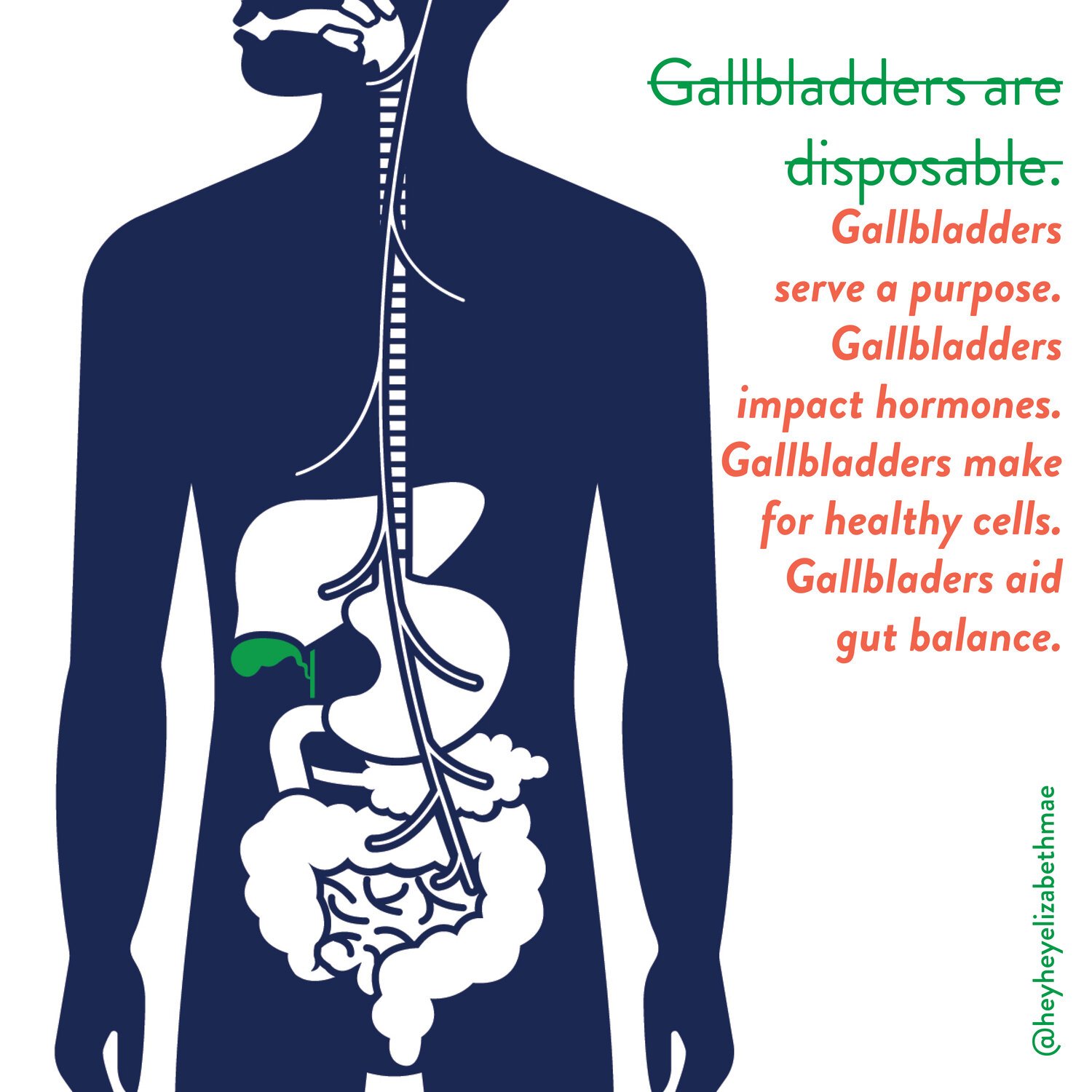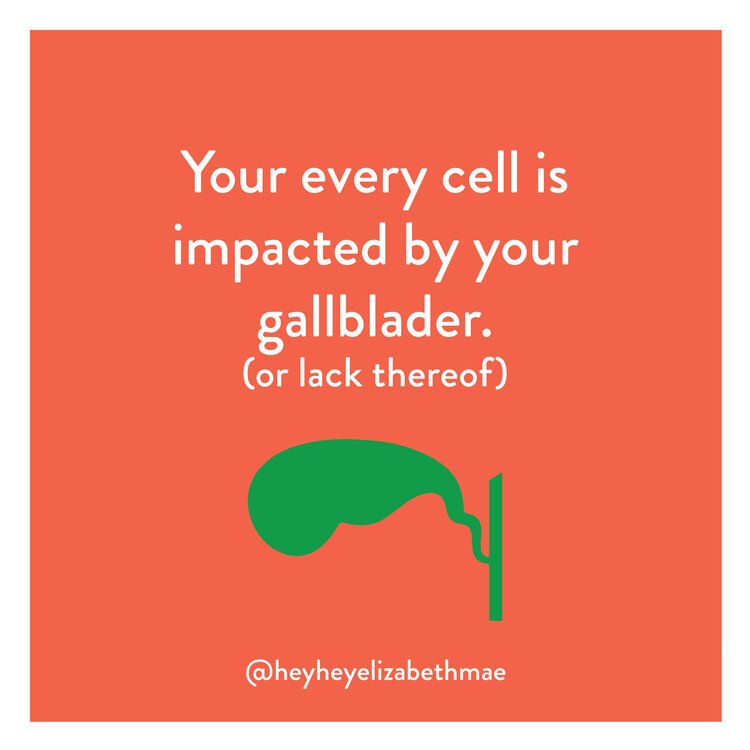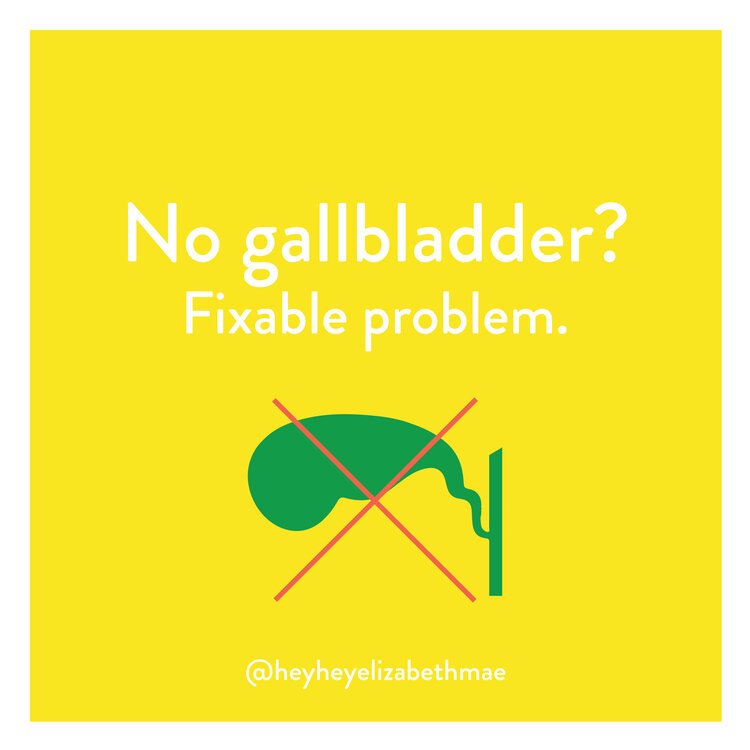Gallbladder...Are You There?
We’ve come to know the gallbladder as disposable, but maybe after all, they’re here for a purpose and use!?
Gallbladders are vital to our body system and they’re one of the most popular organs to be removed so quickly! Surgeons often remove them, they’re regularly misdiagnosed as the root of a problem that continues to be a problem after removal. Once the gallbladder is removed we’re left in the dark with very little education for what’s next.
What does the gallbladder do?
The liver and gallbladder work together keeping our detoxification process flowing and when the gallbladder is gone it interferes or limits that process. Digestion, detoxification, emotions, and our gut are all tied into our gallbladder. If one thing is off (or missing) it can throw the whole system out of whack. It’s so important that we save the gallbladders and here’s why...
We start with the liver because to understand what the gallbladder does we need to start at the top. The liver makes bile, next the gallbladder stores the bile for later use. When you eat food with fats, bile is dispersed, bile emulsifies or breaks down fats that are consumed in all the foods we eat. Remember, both your egg yellow, bacon, broccoli and more have fats - just varying amounts. Your gallbladder is essentially an organ-purse for bile, which the liver has made - and it’s the boss of bile: the gallbladder sends out the necessary amount to digest your dietary fats.
It is through this fat emulsifying bile secretion that the gallbladder facilitates us to absorb fats and fat soluble vitamins, like A, D, E, and K as well as fatty acids like omega-3s. This process is also assisting in the conversion of cholesterol and removes toxins that have been broken down by the liver. When bile is made in the liver, it uses toxins as a building material, during which the toxin is activated and pushed into bile for removal from our body. These are the functions that occur when the gallbladder releases an appropriate amount of bile each time we eat fats.
Another big function of bile, is to cleanse the intestines. Bile is pretty rancid and nasty stuff - which is GREAT if you’re home to intestines. I like to refer to bile as the soap that sprays into your intestinal car wash. Bile helps keep the microbial balance in the gut - preventing bad bacteria from thriving, washing out the and moving along things that don’t belong. In this way, your gallbladder and bile are protective of your intestinal health - and as we know, this is very supportive of overall health: healthy intestines mean healthy nutrient absorption, which means a healthy, nourished body. I just LOVE how it’s all connected!
We need the gallbladder so that we can thrive at every level of health!
Did you know hormones are made from fats? Poor fat digestion happens with poor gallbladder function.
Did you know that every cell is impacted by the gallbladder? Because cell membranes are formed by lipids, or fats - proper digestion of these cell building blocks is essential to create healthy cells membranes and thus cells.
Did you know that eating fats triggers the release of bile and determines the appropriate amount of bile? That’s right - the low-fat, no-fat craze of the 90’s is responsible for a lot of gallbladder loss - ya don’t use it, you may lose it. The biggest cause for gallbladder dysfunction comes from eating a low fat diet and eating an excessive amount of refined carbohydrates. Remember we need those healthy fats for energy my friends, plus healthy fats make everything taste like magic. (Bacon fat, am I right?)
So does this have anything to do with gallstones? High five, for connecting the dots! Gallstones form when bile sits, stagnant and thickens over time or is poorly formed, more thick and not thin, viscous and regularly flowing. Gallstones can form anywhere along the hepatic duct, common bile duct, in the liver or more commonly in the gallbladder.
Can my gallstones go away in a way other than surgery? More often than not, yes. When a client is having gallstone troubles and/or gallbladder struggles, we have simple steps for nourishing the bile flow, breaking down stones with nutrients and generally flushing out and fortifying that pathway, effectively saving many gallbladders.
For the love of hormones and healthy cells, keep your gallbladders! The removal of if can create deficiencies in healthy dietary fats, fat soluble vitamins and fatty acids. When these fats aren’t nourishing the body both hormone and cell formation take the consequence. Removal also leads to higher risks of colon and bowel cancer — we certainly don’t want that!
How to support your Gallbladder:
Eat foods in their whole, unprocessed forms
Vitamin C
Protein is your friend (100 grams is a great goal for my ladies!)
Fiber
Legumes
Dark leafy greens
Omega 3s and Omega 6s -low fat is not the way to go!
Dandelion root tea (helps support the liver)
Berries
Castor oil packs (Support liver health)
Am I doomed if I have no gallbladder?
No way! Especially not if you get educated around how you can replace that organ with life-long bile salt supplementation (work with a practitioner). You’ll want to learn the signs and downstream effects of gallbladder disfunction (hint: floating stools, hypothyroidism, gut infection, bloating, stinky stools, dysbiosis, yeast overgrowth and more…). Remember, the bile secreted in those bigger gush’s when you take in fats is what helps clean the intestines - so GI troubles are a sign of downstream disfunction from gallbaldder loss.
Now that bile flow has changed and so has the consistency, we’re gonna share ways to help you navigate it all. Back to what to do.
Your body, without adequate bile flow, will have a hard time breaking down long-chain fatty acids- found in most of our foods….adding in a bile salt can help break those down. Bringing in bile salts for most folks is a GAME CHANGER. Work with a practitioner here. Some may benefit from eating small, frequent meals so digestion’s easier on your digestive tract, eat in a parasympathetic state, eat proteins throughout the day and try not to pair them with fatty meals (unless you’re using bile salts1), minimize dairy and grains, and throw some sour and bitter foods in your diet.
If you’re struggling with gallbladder discomfort or living without a gallbladder, let’s jump on a short call! Life doesn’t have to feel uncomfortable and your hormones and mood doesn’t have to be all over the place.
Gallbladders are vital to our body system and it’s one of the most popular organs to be removed so quickly! Surgeons often remove them, they’re often misdiagnosed as the root of a problem that continues to be a problem after removal. Once the gallbladder is removed we’re leave us lurking in the dark with very little education for what’s next.



